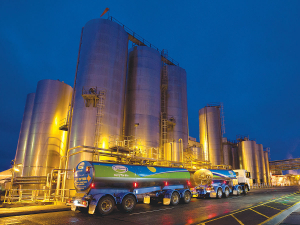Another Windfall for Fonterra Farmers, Unit Holders
Fonterra farmer shareholders and unit holders are in line for another payment in April.
 The Dairy Workers Union says Fonterra's capital structure must change to prevent regional job losses through partial or full plant closures.
The Dairy Workers Union says Fonterra's capital structure must change to prevent regional job losses through partial or full plant closures.
Dairy workers warn that if Fonterra's capital structure isn't changed there will be factory closures and job losses.
In its submission to the parliamentary primary production select committee last month, the Dairy Workers Union (DWU) threw its support behind changes to the co-op's capital structure passed by farmer shareholders one year ago.
The changes require amendments to the Dairy Industry Restructuring Act (DIRA) by Parliament.
While the Government has signalled that it intends to approve the changes, there's strong opposition from rival processors.
Last month the select committee heard submissions in Wellington. Its report was due out last week.
In its submission the DWU says it strongly believes that the future strength of the NZ dairy industry requires the proposed amendments contained in the Bill.
The DWU has members at over 70 dairy manufacturing sites in the country: around 6,000 DWU members work for Fonterra and another 2,500 workers with other industry stakeholders.
It points out that over the last 20 years Fonterra's raw milk market share has reduced fro 96% in 2001 to around 78% in 2021.
"Most dairy industry analysts project Fonterra's market share will reduce further to just over 70% by 2025," it says.
It is concerned that without the changes proposed by the Bil, Fonterra runs the very real risk of under-utilisation of existing assets and the prospect of localised or regional job losses through partial or full plant closures.
The DWU submits that without these proposed DIRA changes, "existing well-paid and highly skilled Fonterra dairy processing jobs may be lost from a provincial or regional area, only for a new dairy employer to become established only several kilometres away, offering substantially lower wages and reduced industry conditions to those offered to current workers".
"The DWU is also concerned that without the proposed changes to Fonterra's capital structure, we may well see the closure of many current Fonterra shifts/departments or even entire worksites."
The union points out Fonterra plants are often the major source of direct and indirect income for many provincial and rural communities.
"It is the DWU's experience that if a worksite does close, there is often very little alternative employment opportunities (particularly on comparable terms and conditions) for workers to transition to in their surrounding provincial area or region.
"As such, the just transition of workers from a decent and well paid existing dairy industry job to another is often quite difficult or simply not possible for affected workers."
More Competition
The Dairy Workers Union says the dairy industry has effectively transitioned from one large employer (Fonterra) to a very competitive industry containing many large and medium-sized dairy companies operating manufacturing and processing sites across the country.
It says over time the DWU has recruited members in most new dairy industry employers and has developed close and constructive partnerships with nearly all of them to support their development.
"The DWU has supported the growth of these new dairy employers because we believe in a competitive and successful dairy industry that employs workers in well paid and highly skilled manufacturing jobs."
Agrisea NZ has appointed Craig Hudson as it's new chief growth officer.
State farmer Landcorp, trading as Pamu, is a forecasting a full-year net profit of around $100 million.
Tony Aitken, chief executive of Ruralco, has been awarded the Excellence in Business Leadership Award at the ANZ Business of the Year Awards.
Global trade has been thrown into another bout of uncertainty following the overnight ruling by US Supreme Court, striking down President Donald Trump's decision to impose additional tariffs on trading partners.
Controls on the movement of fruit and vegetables in the Auckland suburb of Mt Roskill have been lifted.
Fonterra farmer shareholders and unit holders are in line for another payment in April.
OPINION: Staying with politics, with less than nine months to go before the general elections, there’s confusion in the Labour…
OPINION: Winston Peters' tirade against the free trade deal stitched with India may not be all political posturing by the…